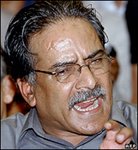 China offers Rs.100 million in military assistance and 14 armed groups active in the Terai organize a unity meeting in India. Such a straightforward link may be difficult to establish, at first. But there are too many dots that can be connected that way.
China offers Rs.100 million in military assistance and 14 armed groups active in the Terai organize a unity meeting in India. Such a straightforward link may be difficult to establish, at first. But there are too many dots that can be connected that way.The first detailed report on Defense Minister Ram Bahadur Thapa’s impending visit to China emerged in India earlier this month while his boss was busy charming his hosts. Bucking the euphoric trend, a top Nepal analyst, Gen. Ashok K. Mehta, urged his country to judge Prime Minister Pushpa Kamal Dahal by his deeds, not words. And those deeds, in Mehta’s view, would surface soon through Thapa.
A Defense Ministry spokesman in Kathmandu said the Chinese assistance would be used according to the needs of the country. Duh! Mehta, for his part, questioned the logic of such cooperation on two grounds. “First, the Maoist and Chinese People’s Liberation Armies are as different as chalk and cheese,” he wrote. “China had castigated the Maoists for hijacking the fair name of Chairman Mao and called them all sorts of names, like 'miscreants' and 'anti-state rebels',” he added. When everyone stopped arms supply to Nepal Army after the royal coup, only China and Pakistan continued to do so, he noted.
But Mehta’s second point was more germane to the context. “Why should the Maoists be trained in China when the integration is to take place in Nepal?” India, he added, had offered to provide vocational training for those PLA members who are not qualified or unwilling to join the Nepal Army. “Moreover, the Indian Army runs an excellent training centre for retiring Gorkhas in Dehra Dun tailored to conditions in Nepal.”
In keeping with his country’s prevailing official stand, Mehta studiously tried avoiding questioning Kathmandu’s freedom to train PLA cadres wherever it chose. “But if this is part of [the] ‘equidistance’ policy or change of direction, the new Maoist leaders need to be reminded that the bulk of training and modernization of the Nepal Army has been done by India,” he said. “Yet it figures nowhere in the security sector reforms,” he lamented. Or, perhaps more appropriately, admonished
Indeed, there has been a long tradition of army-to-army relations between the two countries. Kings Tribhuvan and Mahendra, as Mehta recalled, requested New Delhi to help modernize the then-Royal Nepal Army. (At least, the general who always saw the monarchy as institutionally and congenitally anti-Indian and often let that be known in his impeccable Nepali, has come around to acknowledging the historical record.)
Army chief Gen. Rukmangat Katuwal visited New Delhi last January and, as part of a four-decade-old tradition of exchanging titles, was made an honorary general of the Indian Army. Nepal remains the largest recipient of Indian military assistance and training (which is not much of a record considering New Delhi’s place in international military cooperation.)
During King Gyanendra’s reign, military assistance reached its zenith after the Maoists attacked the military in Dang in November 2001. Clearly, the Maoist debacle in Khara in 2005, a few months after the royal takeover, struck a blow to the hardliners and boosted advocates of a return to the political process. We don’t know precisely what role Indian arms and ammunition played there, especially considering that both sides were using them. Still, Khara gave cover to India to facilitate the 12-point agreement between the Maoists and the Seven Party Alliance. (Would the narrative have stood, had King Gyanendra desisted from shifting South Asia’s geopolitical locus northward at the regional summit in Dhaka?)
The Maoists have said, Mehta recalls, that India would not have let them win the “people’s war”. A section, ostensibly including Thapa, is still holding their military defeat against New Delhi. Hence, his China trip. Reports doing the rounds in Kathmandu suggest a graver game plan: the amalgamation of the two armies into a national force that would be ultimately headed by Maoist commander Nanda Kishore Pun ‘Pasang’. The Chinese government, according to some of these reports, has made arrangements to “train” Pasang sufficiently in fulfillment of the requirements for the top job.
Regardless of the veracity of these reports, the logical question stands. What next from India? Kings Birendra and Gyanendra both were punished for cozying up to China in 1988-89 and 2005-06. In the first instance, a crippling economic embargo coincided with a democracy movement. In the second, democracy was a sufficient rallying cry. Neither course would be practically tenable at this time (unless someone in South Block still believes in instigating the Nepali Congress to launch another movement for democracy against the Maoists).
Hence, the next best thing. Should we expect a 14-party multipoint agreement to be formally signed and unveiled in Patna any time soon?


